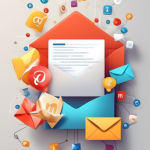The Impact of AI Apps on Daily Life and Productivity
In today’s fast-paced world, AI apps have become a vital component of our everyday lives, significantly enhancing productivity and transforming how we interact with technology. These applications leverage artificial intelligence to streamline tasks, provide personalized experiences, and enable smarter decision-making. As we dive deeper into the impact of AI apps on daily life, it’s essential to explore their various benefits and implications.
Enhancing Personal Efficiency
AI apps excel in helping users manage time and tasks more effectively. With features like smart scheduling and task prioritization, these applications can dramatically reduce the overwhelming nature of daily to-do lists. For instance, an AI app can analyze your work patterns, suggest optimal times for certain tasks, and even reschedule meetings based on your availability. This level of organization allows individuals to focus on what’s truly important, freeing up mental space for creativity and critical thinking.
Personalized Learning and Development
Education has also undergone a transformation through AI applications. Learning platforms utilize AI algorithms to tailor educational content to individual learning styles. Whether it’s through adaptive quizzes or customized study plans, AI provides a rich, personalized experience that fosters growth. This approach not only keeps learners engaged but also accelerates their comprehension of complex subjects.
Health and Wellness Monitoring
AI apps play a crucial role in health management. Fitness and wellness applications track physical activity, dietary habits, and even mental health through AI-powered analytics. By integrating health data, these apps offer personalized exercise routines, meal plans, and mindfulness exercises. This proactive approach empowers users to take charge of their health and wellbeing in a way that was unimaginable a decade ago.
Streamlining Communication
In a world dominated by communication, AI apps offer innovative solutions to stay connected more effectively. Chatbots powered by AI can assist users in managing their communications, ensuring timely responses, and automating repetitive inquiries. Businesses leverage these tools to enhance customer service while individuals use them to organize personal correspondence. This streamlining of communication saves time and increases productivity, allowing users to allocate resources to more critical interactions.
Enhancing Workplace Productivity
Within the workplace, AI applications are invaluable. They automate mundane tasks such as data entry, scheduling, and reporting, which significantly decreases the burden on employees. The result? Enhanced focus on strategic initiatives and creative problem-solving. Collaborative platforms powered by AI also analyze team dynamics, offering suggestions to improve collaboration and efficiency.
- Task Automation: Reduces time spent on repetitive tasks.
- Data Analysis: Provides insights into team performance.
- Smart Assistants: Helps streamline scheduling and project management.
Driving Smart Home Technology
The emergence of smart home technologies has significantly changed how we interact with our living spaces. AI apps serve as the backbone of various smart home devices, allowing users to control lighting, temperature, security systems, and appliances seamlessly. For example, a smart thermostat learns preferences over time, optimizing energy consumption while maintaining comfort. This intelligent adaptation not only promotes efficiency but also enhances overall quality of life.
Inspiring Creativity and Innovation
Sometimes, the greatest productivity boost comes from inspiration. AI apps in creative domains—like graphic design, music composition, and content writing—provide tools that can spark creativity. These applications offer suggestions, generate ideas, or even help in the technical execution of creative work. By reducing the barriers to entry in the creative process, AI empowers more individuals to express their innovative ideas.
The Ethical Considerations
As we increasingly depend on AI applications, it’s crucial to address ethical considerations regarding data privacy and security. Users must be aware of how their information is utilized and ensure that AI services prioritize transparency. Striking a balance between harnessing AI’s potential while protecting user data and autonomy must be of utmost importance.
AI apps are undeniably shaping our daily lives and altering the landscape of productivity. By continuing to evolve and integrate into various aspects of existence, these technologies promise to further enhance personal and professional experiences. As we embrace this shift, understanding the profound impact AI has on our routines will be essential for navigating the future of work and life.
Exploring the Ethical Implications of AI App Development
As artificial intelligence reshapes industries and personal lives, the development of AI applications is on a meteoric rise. This rapid growth raises significant ethical questions regarding privacy, accountability, and the implications of machine decision-making. Each AI application we create carries the potential for both societal benefits and risks, which requires developers and stakeholders to consider their responsibilities with great care.
One of the most pressing ethical implications involves data privacy. Most AI apps rely on vast amounts of personal data to function effectively. When users engage with these applications, they often share sensitive information that, if mishandled, can lead to devastating repercussions. For instance, AI-driven health apps collect data about用户心率、锻炼模式和饮食习惯. If this information is leaked or misused, it can compromise user confidentiality and even endanger lives. Therefore, developers must prioritize robust data encryption methods and transparent privacy policies to protect their users.
Another key concern is algorithmic bias. AI applications learn from data, and if that data reflects existing societal inequalities, the AI can inadvertently perpetuate those biases. An example of this is seen in hiring apps that screen job candidates. If the training data is flawed, these apps may favor certain demographics over others. This creates a ripple effect that exacerbates inequality in the workplace. To counter this, developers should actively seek diverse data sources and apply fairness metrics to ensure that their algorithms treat all users equitably.
Additionally, accountability in AI app development poses another ethical challenge. When an automated system makes a mistake—such as in autonomous vehicles or financial trading apps—it’s essential to determine who is held accountable. Is it the developer, the company, or the end-user? As these applications become more autonomous, establishing clear lines of accountability is crucial. Developers need to implement rigorous testing protocols and maintain logs of decision-making processes to ensure that they can trace errors back to their source and take responsibility.
Moreover, the user experience must be designed with empathy. Users engaging with AI apps often struggle to understand how decisions are made, leading to frustration and a sense of powerlessness. For example, a loan approval app that rejects users without clear explanations creates distrust and anxiety. To combat this, developers should incorporate user-friendly interfaces that explain the workings of algorithms in layman’s terms. This fosters transparency and helps users make informed decisions.
The potential for misuse of AI applications adds another layer of ethical complexity. With their powerful capabilities, AI apps can be exploited for malicious intent, such as creating deepfakes or automating phishing attacks. As developers innovate, they must stay vigilant and consider the potential ramifications of their creations. Proactively identifying and mitigating risks can help limit misuse by implementing safeguards that prevent harm.
Furthermore, the notion of informed consent is central to ethical AI app development. Users should have full knowledge of what their data will be used for and how it may be shared. Therefore, clear and concise terms of service documents are essential. When users provide consent, they should feel assured that they fully understand the implications. By prioritizing user education and adopting best practices, developers create a culture of trust and integrity around their applications.
The societal impact of AI apps cannot be ignored. Developers hold significant responsibility for the broader implications their applications have on community dynamics. For instance, while AI can enhance productivity and drive economic benefits, it can also contribute to job displacement in various sectors. As AI continues to automate tasks, emphasizing reskilling and support for affected workers is vital.
As the software landscape evolves with AI applications, developers must grapple with numerous ethical implications. Focusing on data privacy, addressing algorithmic bias, ensuring accountability, fostering transparency, preventing misuse, facilitating informed consent, and considering societal impacts are essential for responsible AI app development. By proactively addressing these issues, developers can create innovative solutions that not only advance technology but do so ethically and responsibly, reflecting the values and expectations of users and society at large. This commitment ultimately drives sustainable growth and fosters public trust in the rapidly advancing world of AI.
Conclusion
The advent of AI apps has ushered in a transformative era, profoundly affecting daily life and reshaping productivity across various sectors. From personal assistants that manage schedules to advanced data analytics tools that enhance business decision-making, AI applications are interwoven into our everyday routines. They streamline tasks, automate repetitive processes, and offer personalized experiences that cater to individual preferences. This not only boosts efficiency but also affords users the luxury of reclaiming time for more meaningful activities, fostering a better work-life balance. As we increasingly rely on AI to facilitate essential aspects of our lives, it becomes critical to understand both the benefits and the potential challenges that accompany this technological shift.
On one hand, AI apps can significantly enhance productivity. They help organizations analyze vast amounts of data swiftly, glean insights that are invaluable for strategic planning, and provide real-time updates that keep teams informed. For instance, marketing teams leverage AI-driven applications to analyze consumer behavior, enabling them to tailor their campaigns and maximize engagement. Meanwhile, individuals utilize productivity apps that harness AI to optimize their workflows, setting reminders and reducing distractions. In an age where time is often our most precious resource, these tools are indispensable. They serve not just as facilitators of efficiency but as partners in our quest for better productivity, pushing the boundaries of what can be achieved with the right technology.
However, this rapid integration of AI apps into our lives raises essential questions regarding ethical implications. As developers and companies race to implement AI solutions, they must grapple with the moral responsibility that comes with such capabilities. Data privacy is a paramount concern; many AI apps rely on vast amounts of personal information to function effectively. Users often overlook the fine print in terms and conditions, sometimes unknowingly consenting to data collection practices that could infringe on their privacy. Ensuring that these applications operate transparently and that users retain control of their data is an ethical must that cannot be sidelined.
Moreover, the development of AI apps raises issues related to bias and discrimination. If the data used to train these applications is flawed or unrepresentative, the outcomes can perpetuate existing inequalities. For example, an AI recruiting tool that favors candidates from specific demographics can inadvertently exclude diverse talent, perpetuating systemic biases. Thus, developers have a crucial role to play in promoting fairness and inclusivity in AI app design. By implementing rigorous testing and validation processes, they can mitigate these risks and create software that benefits everyone.
Furthermore, the potential for automation to displace jobs cannot be ignored. As AI apps become increasingly capable, there’s a fear that many positions may become obsolete. However, rather than viewing this evolution solely as a threat, it can also be seen as an opportunity for workforce transformation. By embracing new skills and adapting to the capabilities that AI brings, individuals can position themselves in roles that complement technology rather than compete against it. This shift highlights the importance of continuous learning and upskilling, enabling workers to thrive in an AI-augmented environment.
Balancing the advantages of AI apps with their ethical ramifications is a complex undertaking. Developers, users, and policymakers must engage in ongoing conversations about responsibility and accountability. It’s vital to create frameworks that not only foster innovation but also prioritize human values and social good. By establishing guidelines that inform the development and implementation of AI applications, society can harness the power of this technology while safeguarding the interests of all stakeholders involved.
The profound impact of AI apps on our lives and productivity narratives is undeniable. Their ability to enhance efficiency and tailor experiences offers immense potential for progress. Nonetheless, as we navigate this landscape, it is imperative to consider the broader implications of these technologies. Ethical development and deployment of AI apps will ultimately define whether they serve as valuable tools for empowerment or as sources of concern. As we continue to embrace this technology, a balanced approach that prioritizes humanity and ethics will ensure that the integration of AI apps benefits everyone, paving the way for a future where technology and human values coexist harmoniously.


